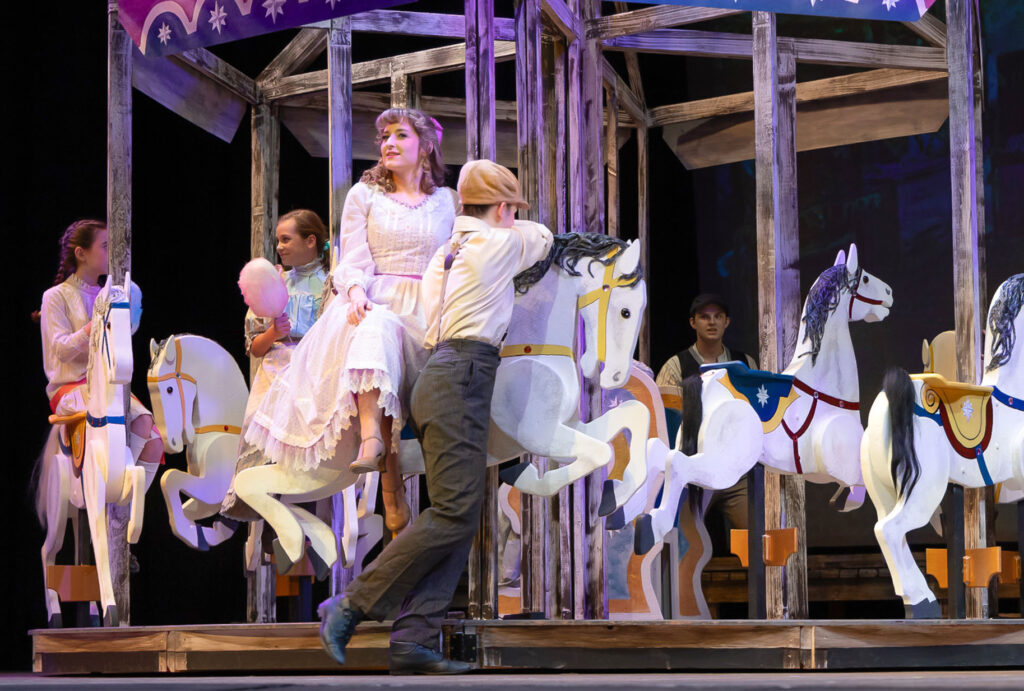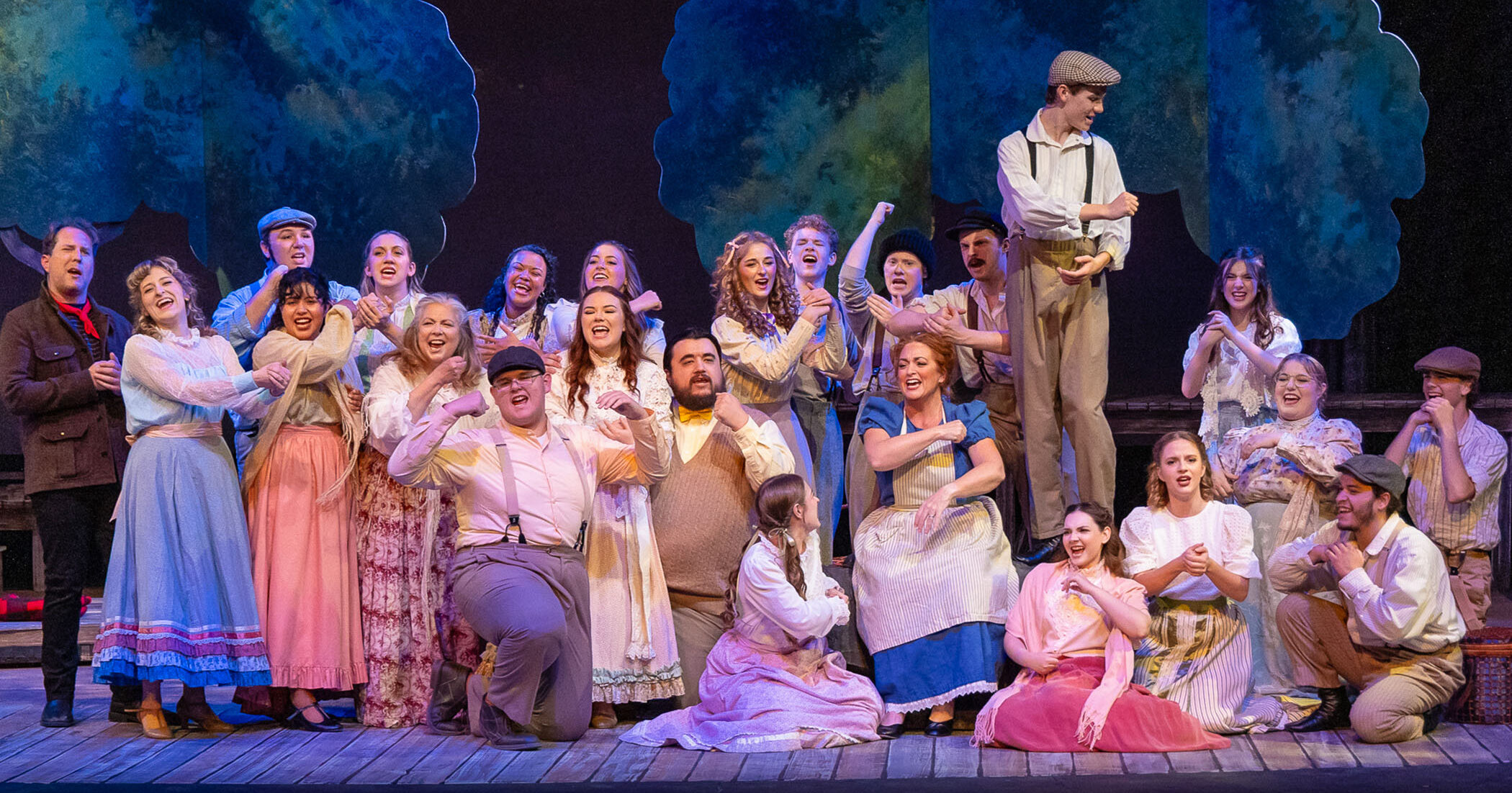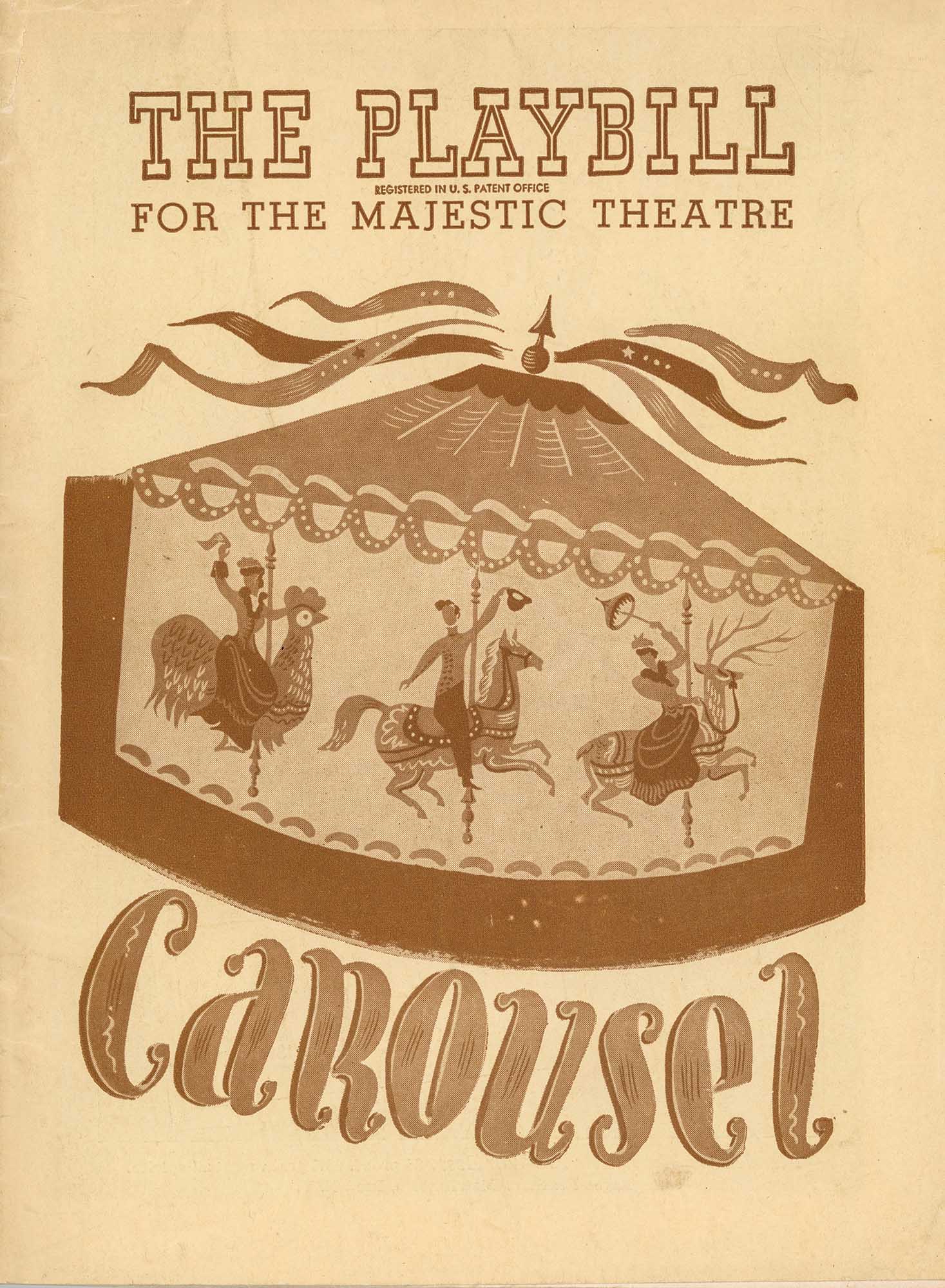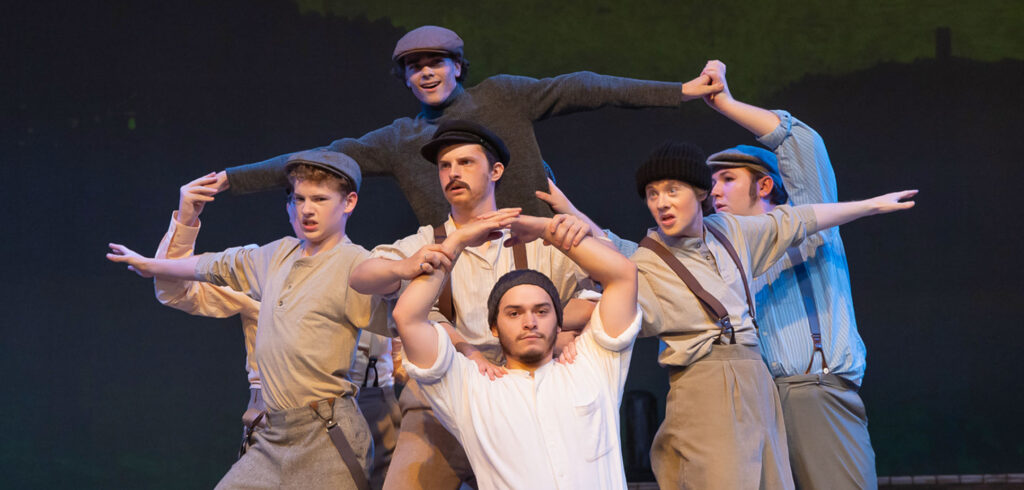In a Maine coastal village toward the end of the 19th century, the swaggering, carefree carnival barker Billy Bigelow captivates a gentle, if determined, millworker, Julie Jordan. They marry, but Billy loses his job and Julie becomes pregnant. In the famous “Soliloquy,” he expresses his excitement and concern about the responsibilities of fatherhood. Intent upon providing a decent life for his family, Billy aids in a robbery. Caught in the act and facing the certainty of prison, he takes his own life and is sent “up there.” Allowed to return to earth for one day fifteen years later, he encounters the daughter he never knew. She is a lonely, friendless teenager, haunted by her father’s reputation as a thief and bully. Selflessly, Billy restores a sense of hope and dignity to both the child and her mother, in a dramatic testimony to the power of love.

Rodgers and Hammerstein briefly considered setting a potential adaptation in Louisiana, as per their producers’ suggestion, but ultimately decided to set their narrative in New England. Rodgers came up with the idea because he owned a home in Connecticut, and the team saw theatrical potential in the sailors, whalers, clambakes, and seashores that define New England iconography. The story of Carousel is told in three separate days over the span of 15 years.

MAIN CHARACTERS
JULIE JORDAN
Julie is a quiet young woman who works and lives at Bascombe Cotton Mill with her friend Carrie Pipperidge. “Deeper than a well,” Julie is more complex that she might first appear, a daydreamer in her own world. She sees something in Billy Bigelow and falls for him. They marry, and despite warnings from others, Julie devotes herself to him. Though Billy treats her poorly, Julie cannot help but empathize with him.
BILLY BIGELOW
The skilled barker for Mullin’s Carousel at a coastal carnival, Billy is strong and attractive, but he’s also a troubled man known by local police as a sly charmer who deceives women for their money. After a spat with his boss, he spitefully quits his job in defense of Julie Jordan. When he finds himself unemployed with a baby on the way, Billy accepts an illicit opportunity to provide for his family and trouble ensues.
CARRIE PIPPERIDGE
Carrie is a spirited and complacent young woman. She is sweet and direct, if a bit naïve, and makes all the acceptable choices to live a proper life with a husband and many children. She works at the Bascombe Cotton Mill in town and lives at their boardinghouse with her close friend Julie Jordan. She is smitten by the ambitious but single-minded Enoch Snow, and they marry.
NETTIE FOWLER
A respected proprietress of a seaside business, Nettie Fowler is Julie’s cousin and trusted confidant. When Billy can’t find work, Nettie gives them a place to stay. When tragedy befalls Julie and her unborn baby, Nettie promises to support her, assuring Julie that she will never be alone.
ENOCH SNOW
A warm-hearted, simple-minded fisherman who loves Carrie, Mr. Snow enjoys simple things like tending a garden and taking care of flowers when he is not working. He dreams of growing a sardine-canning business, being married and having many children. His dreams come true.
JIGGER CRAIGIN
A seaman friend of Billy’s with an eye for danger. Often conning to get by, Jigger is a man with little patience and a quick temper – always with a scheme. He prefers life at sea, where he is free from the laws of the land.
SUPPORTING CHARACTERS
MRS. MULLIN
The proprietress of Mullin’s Carousel, which was left to her by her late husband. She likes to keep an eye – and perhaps more – on Billy, not trusting his relationships with anyone else.
DAVID BASCOMBE
A dignified man of earned wealth, Mr. Bascombe is the owner of the Bascombe Cotton Mill factory, where both Julie and Carrie work.
LOUISE
Billy and Julie’s inquisitive 15-year-old daughter, on the verge of becoming a woman.
ENOCH SNOW JR.
Enoch and Carrie Snow’s son. Pompous and snotty.
STARKEEPER
In the afterlife, the Starkeeper greets Billy and shows him the way it works “up there.” Though he’s not the big man, just the one in charge of the “backyard of heaven,” the Starkeeper grants Billy the chance to return to earth one more time to repair the damage he has done to his wife and daughter.
 Rodgers and Hammerstein’s first collaboration on Oklahoma in 1943 was a massive success due to its social commentary and full integration of music, character building, and dance as plot-furthering devices. Oklahoma launched musical theater into a new stylistic era, and established high expectations for Rodgers and Hammerstein’s following projects. Carousel was Rodgers and Hammerstein’s second musical theater collaboration together. The musical opened on Broadway at the Majestic Theatre on April 19, 1945, and received rave reviews. The musical is mostly renowned for its rich score, which features such hits as “If I Loved You” and “You’ll Never Walk Alone.” Carousel is still widely performed in professional and educational settings today.
Rodgers and Hammerstein’s first collaboration on Oklahoma in 1943 was a massive success due to its social commentary and full integration of music, character building, and dance as plot-furthering devices. Oklahoma launched musical theater into a new stylistic era, and established high expectations for Rodgers and Hammerstein’s following projects. Carousel was Rodgers and Hammerstein’s second musical theater collaboration together. The musical opened on Broadway at the Majestic Theatre on April 19, 1945, and received rave reviews. The musical is mostly renowned for its rich score, which features such hits as “If I Loved You” and “You’ll Never Walk Alone.” Carousel is still widely performed in professional and educational settings today.
Carousel is adapted from Ferenc Molnár’s 1909 Hungarian drama, Liliom. The play Liliom premiered in Budapest in 1909, but was not commercially successful until its restaging in Budapest after World War 1. Rodgers and Hammerstein’s producers at the Theatre Guild, Theresa Helburn and Lawrence Langner, initially proposed the idea of creating a musical adaptation of Molnár’s famed work. However, the songwriting duo initially dismissed the suggestion. Rodgers and Hammerstein weren’t familiar with the Budapest setting and didn’t believe the depressing ending that defines Liliom would translate well to the musical theater genre. In addition, Rodgers and Hammerstein didn’t believe they would be able to easily secure the rights since Molnár had infamously declined the rights both to Puccini, who desired to create an opera adaptation, and Kurt Weill, who desired to create a musical adaptation.
As was expected, Carousel didn’t become as commercially successful or famous as Oklahoma. However, it was very well received and revived for many years. New York City Center, Lincoln Center, and the New York Philharmonic have all presented professional re-stagings of the work, and a film was created in 1956. Carousel was first formally revived on Broadway in 1994 at the Vivian Beaumont Theater and the production won many awards, including the Tony for Best Revival of a Musical. The musical was revived a second time in 2018 at the Imperial Theatre and notably featured Joshua Henry, Jessie Mueller, and Renée Fleming.

Photos by Marlee Melinda Andrews
Recommended for ages 12 and over due to mature themes, violence and references to domestic abuse.
Domestic violence can never be condoned or ignored. If you are experiencing domestic violence or abuse in any form, help is available:
| YWCA Spokane Call 509-326-2255 Text 509-220-3725 |
National Domestic Violence Hotline (24/7) 800-799-7233 |
The Trevor Project (24/7) Call 866-488-7386 Text ‘Start’ to 678-678 |
